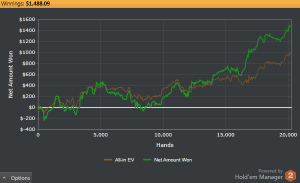Do you have a New Year’s resolution for 2016? If it involves poker, and making money, we have some tips that should help you on your road to riches.
If you are fairly new to poker, remember that becoming profitable takes patience, and hard work. When you have a deeper understanding of the nature of the game, you’ll be one step closer to achieving your goals.
Poker can be defined as a game of skill, but there is a short term luck factor that will cause your results to meander away from the truth of your skill. You can end up with more money than your decision making has earned, or less.
Don’t be discouraged, and don’t get too far ahead of yourself until you have played a lot of games. Don’t be just another one who tried and went broke. Manage your money carefully, and remember, you’re playing to earn and learn, not to gamble.
#1. Work on Your Skills
Putting in work at the tables is an obvious first step to success. How can you learn if you’re not playing? But putting in work away from the tables, is a lesser known concept. Instinctively, all players pick up information as they play, and you will improve purely by playing.
If you really want to take great strides forward in your development though, read up on key strategies, and examine replays of your key hands to see what you could have done differently – even in the sessions where you made a profit.
Also, learn to identify weak players and sit at softer tables. You may learn more from playing against great players, but you’ll go broke quickly. Be honest with yourself about which games are beatable.
What you should do in 2016:
Stop thinking that simply playing poker will propel you to your goals. Be ready to work hard away from the table. Books, forums, strategy videos, and note taking are all necessities. The hard worker will always surpass the lazy player with natural talent. ‘

#2. Accept The Part That Luck Plays: Don’t Let Emotion Control You
We all find ourselves saved or skewered by luck, relentlessly, from the moment we start playing poker.
Everyone reacts differently to luck, but try to remember it is just a mirage. Up close, in the moment, it might appear that luck is running the show, but in truth, numbers and decisions govern poker. You just need to put in the miles before it becomes apparent. Without being misled by luck, no amateur would ever sit down to play. It’s a very necessary illusion.
Good poker players learn to focus on the decision, not the outcome. Keep making excellent decisions and the outcomes will do what they’re supposed to, immediately, or eventually. The worst mistake you can make, is to allow unlucky outcomes to lead you into making bad decisions led by emotion.
What you should do in 2016:
Don’t always assume that bad luck is at the root of your problems. The mental side of poker is a weakness for countless players. Many professionals now have a mental game coach. If that sounds too expensive, invest in books about remaining clear headed at the poker table or start meditating

#3. Make a Financial Plan
When you sit down at the poker table, you are making an investment. In order to know how good, or bad this investment is, you should track your results. Once you have played plenty of games, this will give you crucial, clear information, so you can make better investments in yourself. You must also manage your bankroll by understanding the worst case scenario of running bad, and allowing for more than that within your bankroll. It is guaranteed to happen at some point. Financial planning is very important in poker. Knowing exactly how you will reach your goal, will get you there a lot faster.
What you should do in 2016:
Set yourself goals, and manage your money accordingly. Track your results, and discover how to get the best rate of return from your skill set.

Start to Change Your Approach Now!
Be proactive, and start changing now. Take a pen and paper and answer the following questions:
Skill:
– Are you putting in work away from the table? If you are, can you find ways to optimise the quality and quantity of these working hours?
– Can you make new connections with players that you could learn from?
– Are you selecting the best tables when you play?
Luck and Mental Factors:
– Do you have tilt problems?
– How much does emotion affect you when things go badly?
– Which situations make you tilt, and why?
Money Management:
– Do you track your results?
– Do you keep the right bankroll to protect yourself against going broke?
– Are you strict enough with yourself about which stakes to play?
If you can find just a few small problems within your answers that you can start fixing right now, each one of them will add a little extra to your win rate. In the next 12 months, those small fixes can become the foundations for your goals to be realised. Good Luck!
Article by Craig B.




